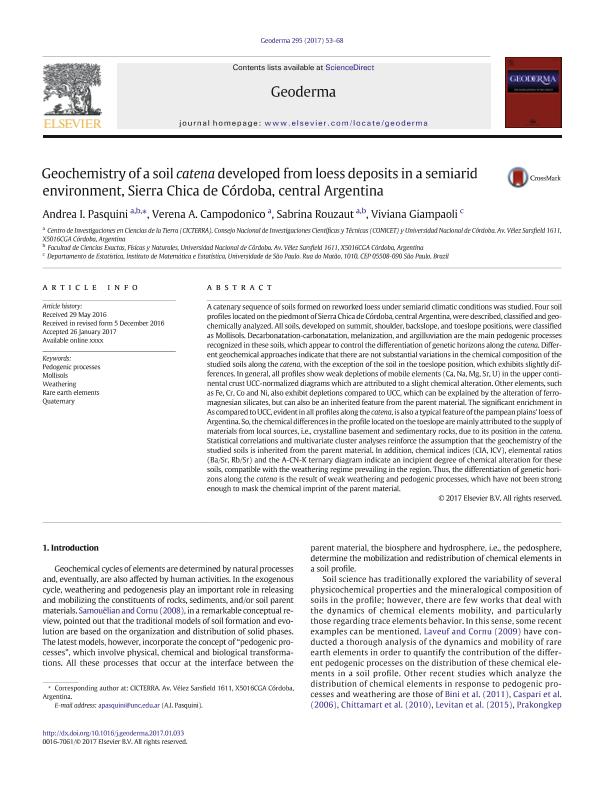Mostrar el registro sencillo del ítem
dc.contributor.author
Pasquini, Andrea Ines

dc.contributor.author
Campodonico, Verena Agustina

dc.contributor.author
Rouzaut, Sabrina

dc.contributor.author
Giampaoli Viviana
dc.date.available
2018-05-11T12:55:13Z
dc.date.issued
2017-06
dc.identifier.citation
Pasquini, Andrea Ines; Campodonico, Verena Agustina; Rouzaut, Sabrina; Giampaoli Viviana; Geochemistry of a soil catena developed from loess deposits in a semiarid environment, Sierra Chica de Córdoba, central Argentina; Elsevier Science; Geoderma; 295; 6-2017; 53-68
dc.identifier.issn
0016-7061
dc.identifier.uri
http://hdl.handle.net/11336/44869
dc.description.abstract
A catenary sequence of soils formed on reworked loess under semiarid climatic conditions was studied. Four soil profiles located on the piedmont of Sierra Chica de Córdoba, central Argentina,were described, classified and geochemically analyzed. All soils, developed on summit, shoulder, backslope, and toeslope positions, were classified as Mollisols. Decarbonatation-carbonatation, melanization, and argilluviation are the main pedogenic processes recognized in these soils, which appear to control the differentiation of genetic horizons along the catena. Different geochemical approaches indicate that there are not substantial variations in the chemical composition of the studied soils along the catena, with the exception of the soil in the toeslope position, which exhibits slightly differences. In general, all profiles show weak depletions of mobile elements (Ca, Na, Mg, Sr, U) in the upper continental crust UCC-normalized diagrams which are attributed to a slight chemical alteration. Other elements, such as Fe, Cr, Co and Ni, also exhibit depletions compared to UCC, which can be explained by the alteration of ferromagnesian silicates, but can also be an inherited feature from the parent material. The significant enrichment in As compared to UCC, evident in all profiles along the catena, is also a typical feature of the pampean plains´ loess of Argentina. So, the chemical differences in the profile located on the toeslope aremainly attributed to the supply of materials from local sources, i.e., crystalline basement and sedimentary rocks, due to its position in the catena. Statistical correlations and multivariate cluster analyses reinforce the assumption that the geochemistry of the studied soils is inherited from the parent material. In addition, chemical indices (CIA, ICV), elemental ratios (Ba/Sr, Rb/Sr) and the A-CN-K ternary diagram indicate an incipient degree of chemical alteration for thesesoils, compatible with the weathering regime prevailing in the region. Thus, the differentiation of genetic horizons along the catena is the result of weak weathering and pedogenic processes, which have not been strong enough to mask the chemical imprint of the parent material.
dc.format
application/pdf
dc.language.iso
eng
dc.publisher
Elsevier Science

dc.rights
info:eu-repo/semantics/openAccess
dc.rights.uri
https://creativecommons.org/licenses/by-nc-sa/2.5/ar/
dc.subject
Pedogenic Processes
dc.subject
Mollisols
dc.subject
Weathering
dc.subject
Rare Earth Elements
dc.subject
Quaternary
dc.subject.classification
Meteorología y Ciencias Atmosféricas

dc.subject.classification
Ciencias de la Tierra y relacionadas con el Medio Ambiente

dc.subject.classification
CIENCIAS NATURALES Y EXACTAS

dc.title
Geochemistry of a soil catena developed from loess deposits in a semiarid environment, Sierra Chica de Córdoba, central Argentina
dc.type
info:eu-repo/semantics/article
dc.type
info:ar-repo/semantics/artículo
dc.type
info:eu-repo/semantics/publishedVersion
dc.date.updated
2018-05-09T16:15:46Z
dc.journal.volume
295
dc.journal.pagination
53-68
dc.journal.pais
Países Bajos

dc.journal.ciudad
Amsterdam
dc.description.fil
Fil: Pasquini, Andrea Ines. Consejo Nacional de Investigaciones Científicas y Técnicas. Centro Científico Tecnológico Conicet - Córdoba. Centro de Investigaciones en Ciencias de la Tierra. Universidad Nacional de Córdoba. Facultad de Ciencias Exactas Físicas y Naturales. Centro de Investigaciones en Ciencias de la Tierra; Argentina
dc.description.fil
Fil: Campodonico, Verena Agustina. Consejo Nacional de Investigaciones Científicas y Técnicas. Centro Científico Tecnológico Conicet - Córdoba. Centro de Investigaciones en Ciencias de la Tierra. Universidad Nacional de Córdoba. Facultad de Ciencias Exactas Físicas y Naturales. Centro de Investigaciones en Ciencias de la Tierra; Argentina
dc.description.fil
Fil: Rouzaut, Sabrina. Consejo Nacional de Investigaciones Científicas y Técnicas. Centro Científico Tecnológico Conicet - Córdoba. Centro de Investigaciones en Ciencias de la Tierra. Universidad Nacional de Córdoba. Facultad de Ciencias Exactas Físicas y Naturales. Centro de Investigaciones en Ciencias de la Tierra; Argentina
dc.description.fil
Fil: Giampaoli Viviana. Universidade de Sao Paulo; Brasil
dc.journal.title
Geoderma

dc.relation.alternativeid
info:eu-repo/semantics/altIdentifier/doi/http://dx.doi.org/10.1016/j.geoderma.2017.01.033
dc.relation.alternativeid
info:eu-repo/semantics/altIdentifier/url/https://www.sciencedirect.com/science/article/pii/S0016706117301507
Archivos asociados
